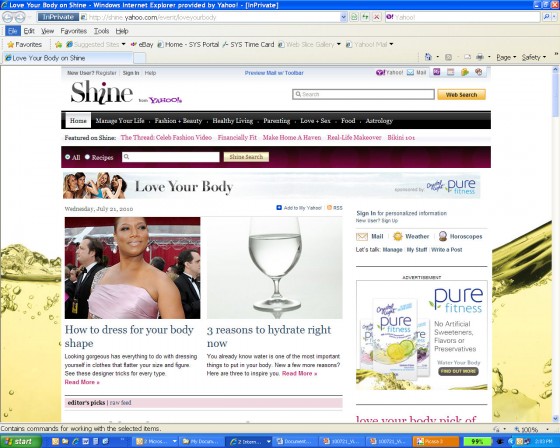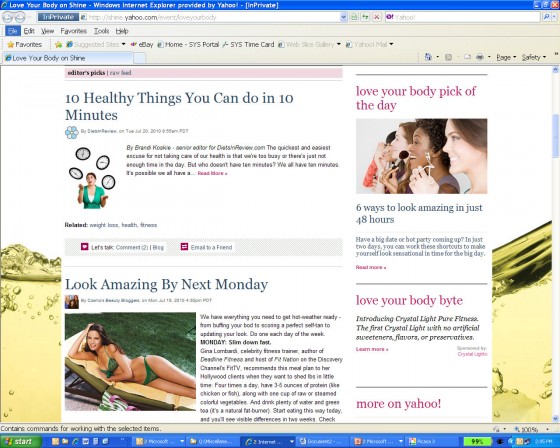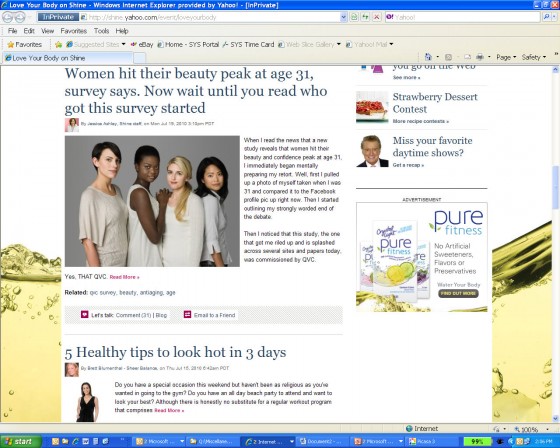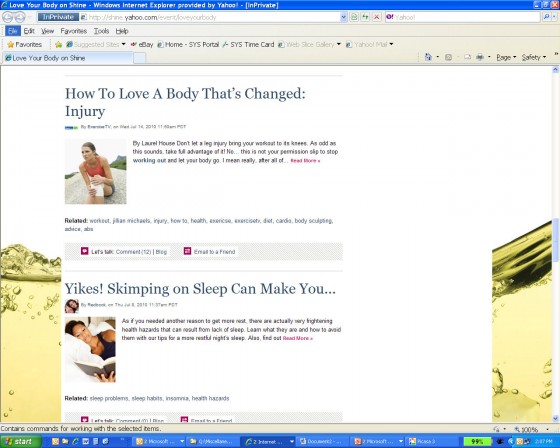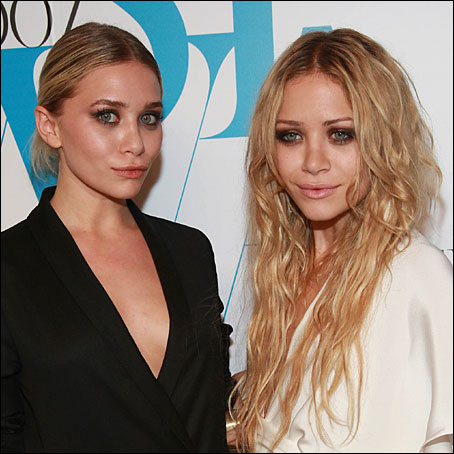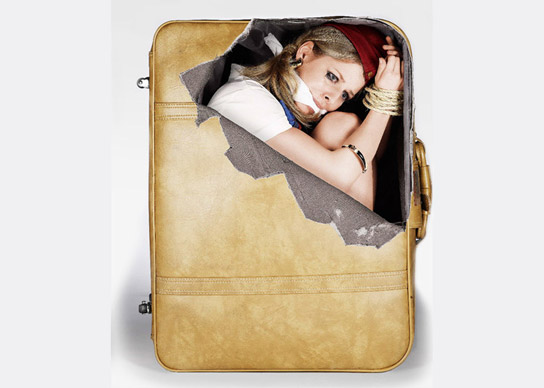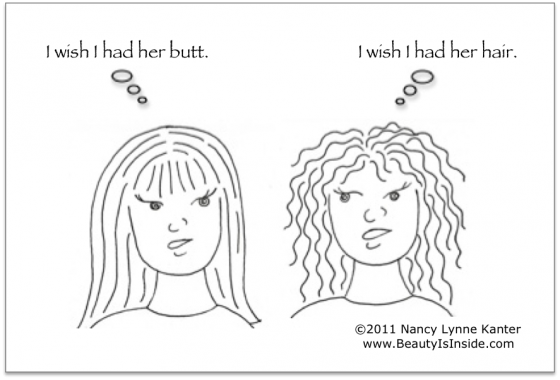
If Beauty Is Inside, Why Do We Hate Our Guts?: Pop Culture, Sexism, & Body Image
Learn moreIn a recent study, researchers found that 100% of women felt bad about their appearance after looking at beauty magazines for just a few minutes. From one of the authors: “Surprisingly, we found that weight was not a factor. Viewing these pictures was just bad for everyone,” said Laurie Mintz, associate professor of education, school and counseling psychology in the MU College of Education. “It had been thought that women who are heavier feel worse than a thinner woman after viewing pictures of the thin ideal in the mass media. The study results do not support that theory."
I happened upon this brilliant way of fighting back. This was part of a campaign by the National Eating Disorder Information Centre (NEDIC) in Canada that targeted beauty magazines. From NEDIC's website: "To involve the public in our campaign, this transit shelter ad appeals to dieters and those who feel the pressure to diet (virtually all women), empowering them with a way to really shed their weight problem."
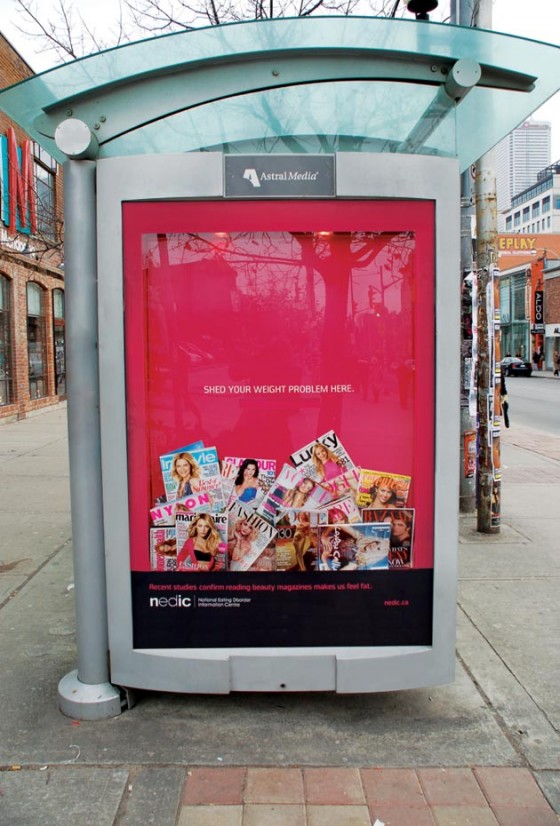
Close-up:
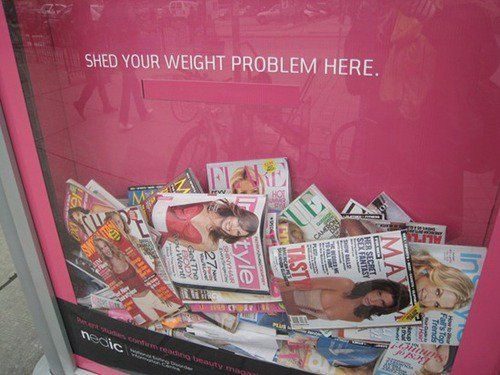
Text at bottom of display:
"Recent studies confirm reading beauty magazines makes us feel fat."
Another study demonstrated "... the role of the media in shaping, rather than merely reflecting, societal perceptions of the female body. Consistent with our hypothesis, it was found that women's body image satisfaction is, indeed, influenced by their exposure to the thin ideal presented in fashion magazines."
(Want more? Here's one of my previous posts on this topic.)
June's issue of Vogue Italia (NSFW due to some nudity) offered a refreshing break from the typical images of female perfection plastered over every fashion and beauty magazine. This issue, entitled Belle Vere or "True Beauty," featured "plus-size" models both on the cover and in a photo spread. As is the case in the media, plus-size means average-size in real life. I don't know the statistics in Italy, but the average American woman is 5’4” and weighs 165 pounds. A woman this size would most certainly be plus-size in the modeling world, and it would be quite uncommon for a magazine to have her gracing its cover, at least in the United States.
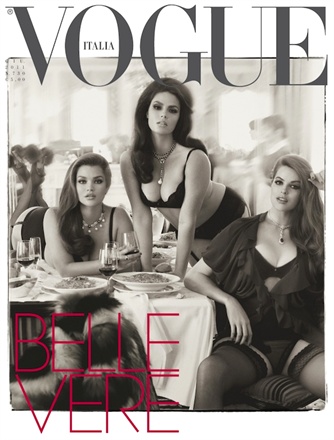
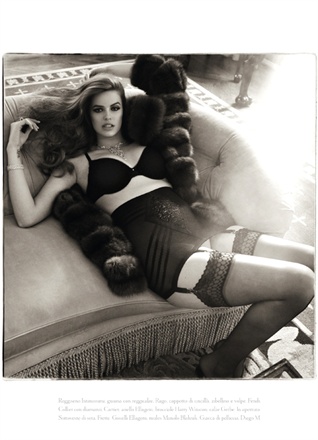
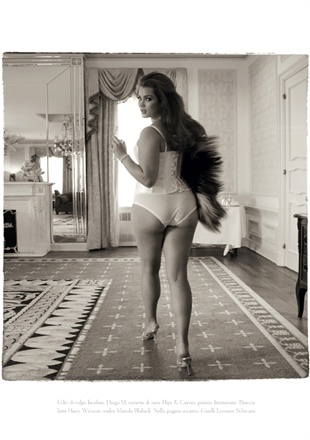
In a previous post, I discussed how the media create arbitrary flaws in women's bodies, then conveniently offer up solutions to fix those flaws. That post was about ugly armpits. Today's example is about the land down under -- and I don't mean Australia. (I've also written about this flawed area before.) Yesterday, Jezebel posted a clip from the CBS daytime show, "The Doctors," in which they discuss how "Your Aging, Deflated Vagina Is Like A Hamburger." (Well technically, it's your aging, deflated vulva, but let's move on.)
On the show, Dr. Jennifer Berman, expert in the field of female urology and sexual medicine, made her case by explaining how your private parts become less puffy as they succumb to gravity, age, and having babies, and this makes them sag and deflate. She used a hamburger as a pretend vulva. (I guess a taco would've been too tacky.) She held the burger sideways so that the meat patties represented the inner labia minora and the buns were the outer labia majora -- the parts that don't puff enough. (Side note to show producers: On the next show, you could totally add different condiments to the burger in order to discuss a variety of vaginal maladies, e.g., cheese, mayo, ketchup, etc. Just a thought.)
Dr. Berman explained that a procedure called the "Labial Puff" can counteract the sagging and deflating. It entails injecting the outer lips with cosmetic filler, similar to the injections done to the lips on your face. It allegedly helps to revolumize the labia majora -- or in other words -- it puffs your muff.
"Ladies, you're not going to notice it if you're just laying down or sitting down. I actually had to bend over and look under and I swear to God, I almost had a heart attack [insert audience laughter]. And it was subtle, but it was there," she said.
So, let's get this straight. This alleged labial malformation isn't noticeable unless you're bending over and looking under yourself in some sort of mangled yoga pose, right? And not only that, but while you're contorting yourself to search for your most recently discovered fucked up body part, you discover that it's only subtly fucked up? It doesn't hurt or interfere with your sexual function, but it supposedly looks subtly fucked up according to those who have an interest in fixing it. And that alone is a good reason to perform a cosmetic procedure on it? That's what I think is fucked up.
And that, boys and girls, is an example of how the media invent an arbitrary flaw in the female body to create a need, and then serve up a solution to fulfill that need.
The Labial Puff is supposed to make your vulva look more youthful ... some would say even childlike. So here's a question: what about the guys? When boys go through puberty, their testicles drop, and they continue their downward descent as men age. Why don't we hear "The Doctors" make a case for the Sack Lift to make men look more youthful? Like the Labial Puff, it could be just a simple outpatient procedure in which they inject cosmetic fillers to pump up the testicular volume. Then they could do a couple of little snips and stitches to raise them up to a more youthful -- and virile state.
The best part? "The Doctors" could explain the procedure on their show by using a couple of meatballs.
It's quite rare for advertising to celebrate women's extra curves. Sure, Dove's "Campaign for Real Beauty" uses a variety of women in their ads to show that different bodies can be beautiful. But as I mentioned in a previous post, their parent company, Unilever, contradicts itself with sexist Axe ads geared toward men. Olay's recent slogan was "Love the skin you're in," but their ads still photoshopped all of the pores, age spots, wrinkles, cellulite, and zits out of the skin their models were in.
In 1997, The Body Shop launched an ad campaign with the image below to inspire women to accept their bodies. I remember being excited as the store even handed out stickers with this image. Unfortunately, the ad soon disappeared after Mattel threatened to sue over the unauthorized use of Barbie's likeness. Unlike most companies that sell beauty products, The Body Shop hasn't relied on idealized images of women to sell their face creams, body butters, and lip gloss. They have a history of being a socially responsible company that supports humanitarian and environmental causes. Their ad was a refreshing break from all of the other media messages that pressure women to look perfect.
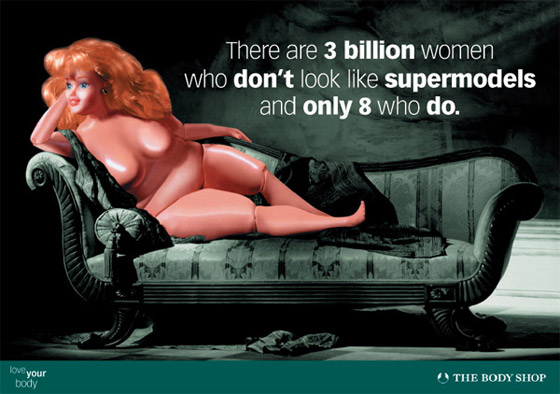
Tall, striking
Perfectly thin
Elegant
Ideal.
Sexy, child-size clothing
Barely covers
Breasts
Disproportionate to
Fat-free thighs
And soft, gentle curves
Of ribs, prominently displayed.
Beautiful, thick hair
Glued at the scalp
Frames a flawless face
Etched in fine marble
Expressionless, void
Of unappealing character lines.
Teeth capped in pearls
To hide bile's erosion.
Twenty years old --
Over the hill in five more.
She is who we
Aspire to be.
She is beauty.
Several men -- all strangers -- have told me to smile over the years. At work, on the street, in a store -- I'd hear variations of: "Why aren't you smiling?", "You should smile; you'd look prettier", or just flat-out "Smile!" I assumed it was some awkward form of flirtation, so I generally managed to force out a weak attempt. But it always made me feel uncomfortable and a bit irritated.
Commanding a strange woman to smile isn't exactly the pinnacle of good manners, so why did I feel compelled to do as I was told? Am I supposed to just grin like a fool on command? Don't I have a right to have a shitty day or simply not to feel like walking around with a Stepford-wife smile perpetually glued onto my face? It always felt kind of absurd and controlling.
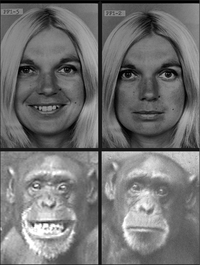
I hadn't given it much thought until discovering that other women deal with this crap too. Just google "men telling women to smile" to see how common it is. Contrary to what I'd assumed, this is more than just a lame pick-up line. Why would some random jackass think it's at all acceptable to tell a strange woman to smile for him like a trained chimpanzee? What right does he have to dictate to a stranger how she should behave?
Well, if he believes he's more powerful than she is, then he probably believes that he does have the right. And the woman who smiles on command, however begrudgingly, may unconsciously agree. A recent study has found that those who break conventional rules of politeness were perceived as being more powerful. Examples of "powerful" behavior included: smiling less, interrupting others, overstepping boundaries, and speaking in a loud voice. In the study, those who acted rude, inconsiderate, or overbearing were seen as more able to get people to do what they wanted, more in control, and more competent in making decisions.
What would happen if a woman acted in a similarly condescending way? How many women tell male strangers, "Smile, it can't be that bad"? If they did, would they be seen as powerful, or would they just be seen as domineering bitches? We're socialized to be sweet, polite, and nice little girls who turn into sweet, polite, and nice little ladies. We may have gained a significant amount of power in the last hundred years, but we're still expected to act in pleasing ways and smile on command no matter how powerful we are -- or else we'll face the repercussions. And what are those repercussions? Well, there's a good chance that we'd be called a bitch or a cunt for refusing, because the kind of guy who'd command a woman to smile would be the same kind of guy who'd get defensive if she didn't.
In my previous post about how the media treat female politicians, I mentioned how powerful women often face gender-based attacks, which can be based on appearance (fat, ugly), sexuality (frigid, slut), femininity (butch, ball-breaker), or character (liberal, feminist). Even actions that appear to be compliments -- such as flirtatiously telling a woman to smile -- are attempts to direct how she acts and consequently serve as attempts to undermine her power.
When men tell women to smile on command, it's a boundary violation; it's an act of arrogance and dominance. It's a way to police women's behavior by making it pleasing to men. It's the underlying expectation that women should perform for men and serve their desires.
This sense of entitlement permits men to dictate what women should do with their bodies -- whether it's smile, look sexually available, or give birth whether they want to or not.
If this study's results can be broadly applied, then we associate “power” with being inconsiderate, overbearing, and controlling as a culture. This runs contrary to how women are expected to behave (or even how decent men should behave, for that matter). Either the rest of us are going to have to start acting more obnoxiously ourselves, or we're going to have to start redefining power in less obnoxious ways.
Maybe then I'll feel like smiling.
I spotted these bibs at Babies"R"Us while helping my friend choose gifts for her baby shower registry. Interesting how there's no equivalent cool mom bib. Apparently, moms are just supposed to be babes, even from the perspectives of their babies. What's next: My mom's DDs make better milk than your mom's B-cups?
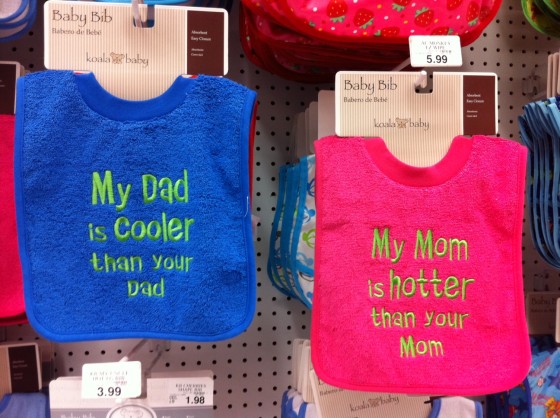
Step aside, cankles! There's a new body part to hate!
Raise your hand if you know what it is. Raise your hand if you're sure. Now turn your head toward that raised arm.
That's right, ladies -- your armpits are hideous. They're hairy, they're smelly, and they're ugly. But don't fall into a pit of despair.
Fortunately Unilever, the makers of Dove®, have a solution! Dove's new "Go Sleeveless" deodorant claims to make a woman's armpits more attractive in just five days! Hear that, ladies? In a little bit, your pit can be the shit!
As Stephen Colbert states in this clip from the Colbert Report, "One of the secrets of sales is fulfilling the public's need. The other secret is inventing the public's need."
Incidentally, Unilever is the same company that developed the Dove® "Campaign for Real Beauty" a few years ago that featured "real women" instead of models in its ads as a way to counter sexist media imagery. Unilever also owns the Axe® line of mens' products whose ads feature the same sexist imagery that Dove® is allegedly fighting against. This site shows one of the videos put out by the Dove® campaign, along with a brilliantly re-edited video that juxtaposes it with ads by Axe®.
As Colbert says, "If there's one sure way to financial security, it's inventing women's insecurity."
We often measure our success as women in numbers -- judging ourselves in terms of pounds, size, and age. Lower numbers indicate success, while higher equal failure. And as such, we’ve developed a counter-intuitive association between losing and gaining. In our worlds, losing equals success and gaining equals failure.
We focus on losing weight, lowering our sizes, taking years off our faces. But consider for a moment how refreshing it would feel to focus on losing the following instead:
insecurity
anxiety/depression
self-critical voice
hopelessness
judging ourselves from the outside in
And instead of worrying about gaining weight, going up in size, or showing years on our faces, how great would it be if we could gain these?:
confidence passion intuitive knowledge joyfulness/hopefulness experiencing ourselves from the inside out
Our culture has taught us the convoluted notion that losing superficial aspects of ourselves like weight will lead to positive internal states like happiness. But then there always seems to be one more step to take, one more improvement to make, one more product to buy. That carrot is continually dangled farther and farther away, making us feel like failures, and drawing us toward that extra slice of carrot cake for temporary relief. This cycle may be self-defeating to us, but it also helps the beauty and diet industries gain billions of dollars in revenue, while losing nothing.
Maybe it’s time to reexamine what losing and gaining really mean.
 It’s hard to be a woman. So much is expected of us: we need to be the perfect wives/girlfriends, selfless moms/friends/daughters, successful businesswomen -- all while being beautiful and thin. We’d like to think that since other women face similar challenges, that they would support us in ours. We’d like to think that we’d do the same for them. But sadly, this is often not the case. We tend to compete more than collaborate. We pick each other apart with the same critical eyes through which we see ourselves. Deep inside, we think that by knocking her down a few pegs, we might not feel so deficient in comparison. But it never works. In subtle ways, Sell-Out Sisters sabotage the collective power of us all. It’s not just the mean girls who’ll throw a fellow sister under the bus.
It’s hard to be a woman. So much is expected of us: we need to be the perfect wives/girlfriends, selfless moms/friends/daughters, successful businesswomen -- all while being beautiful and thin. We’d like to think that since other women face similar challenges, that they would support us in ours. We’d like to think that we’d do the same for them. But sadly, this is often not the case. We tend to compete more than collaborate. We pick each other apart with the same critical eyes through which we see ourselves. Deep inside, we think that by knocking her down a few pegs, we might not feel so deficient in comparison. But it never works. In subtle ways, Sell-Out Sisters sabotage the collective power of us all. It’s not just the mean girls who’ll throw a fellow sister under the bus.
NOTE: NSFW image below
I had just finished writing this post when I received an email forward from someone close to me. It was a perfect example of a Sell-Out Sister. The woman who sent me this has been morbidly obese for much of her life. Since she was a child, she's been ridiculed and treated poorly due to her weight, and this treatment continued into adulthood. This makes her selling out particularly sad.
Here's the email:
| Subject: FW: Garlic Warning!!!!! Must Read This is terrible !!!!!!!! |
|
OMG...this is really terrible. And I have been touting the benefits of garlic for years!!!
I hope this doesn't happen to anyone I recommended it to.
For years, doctors and scientists have told us that some foods are good for us, only to be told later that they bad for us, and again they tell us that some foods are bad for us, and all the time they've been good for us... and there doesn't seem to be much proof either way to suggest what is good or bad... until now, that is. Garlic is definitely BAD for us if it's true that "You Are What You Eat!" ...scroll down...
You have been Garlic'd. Now you're it!! One rule to this game ... You CANNOT get someone who has already gotten you! So get as many people as you can! (before they get you) I got you first ... You can't get me back! |
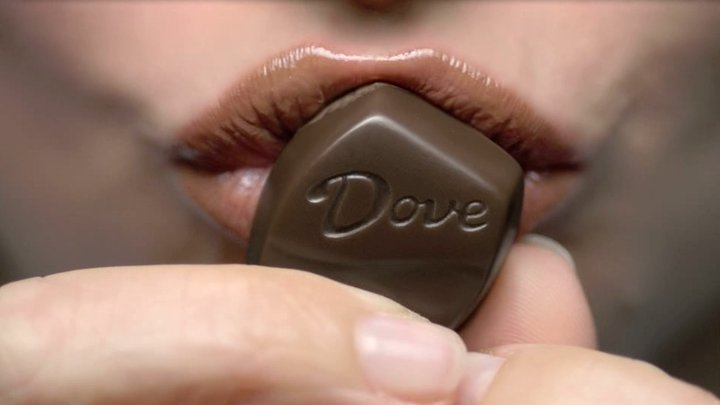 Seriously, Dove®. Just because I love your chocolate, it doesn’t mean I love your chocolate.
Seriously, Dove®. Just because I love your chocolate, it doesn’t mean I love your chocolate.

Dressing rooms are claustrophobic stalls of despair and self-loathing. They're places where you gasp "Holy shit!" after catching a glimpse of your ass in the fluorescent-lit three-way funhouse mirror. Given that environment, it's amazing that we're ever fortunate enough to find one article of clothing that doesn't make us feel lumpy, dumpy, and frumpy.
Dressing rooms are places where size-2 teenage girls complain to their friends that every pair of jeans makes them look fat. They're places where women yank the dreaded light-washed, high-waisted mom jeans over the child-bearing hips that once gave birth to those teenage girls.
Even those of us who love shopping for clothes don't always love trying them on. When the saleswoman asks me over the latched door, "Do you need a different size?", sometimes the only thing I hear is, "Do you need different thighs?"
Why yes, yes I do, thank you. And while you're checking the racks, can you also see if your store carries any self-confidence? It seems I'm running a little low.
We do have moments of hope in dressing rooms though. We hope that we'll fit into the clothes that hot girls fit into. We hope that black is indeed slimming. We hope that we'll look pretty. Or we just hope that the shapeless sweater will make us disappear into the background.
How many of us have heard a woman in a dressing room evaluate her reflection and then proclaim that she looks damn good? How many of us have uttered these elusive words? Not enough -- and that's a damn shame. What's worse is that we'll often leave those dressing rooms deflated and defeated, hoping that our new leather handbags will distract us from feeling like the cows they were made of. It's depressing how much power we give to a mirror or a jean size.
Unflattering mirrors and lighting draw our already critical eyes to our "trouble areas," but consider for a moment that maybe our true trouble area is not found in the mirror at all.
Maybe it's in not feeling beautiful within.

Fortunately, an unlikely heroine is taking up the cause! In response to the company's financial difficulties, The Daily Show's Kristen Schaal offers an appeal for donations to the Save the Mansion Fund. As she sweetly says: "Living, breathing women with hopes and dreams are standing by to take your pledge."
| The Daily Show With Jon Stewart | Mon - Thurs 11p / 10c | |||
| Save the Playboy Mansion Fund | ||||
|
||||
“[This is] about women who will prowl over 30 stores in 6 malls to find the right cocktail dress, but who haven’t a clue how to find fulfillment or how to wear joy …”
















































